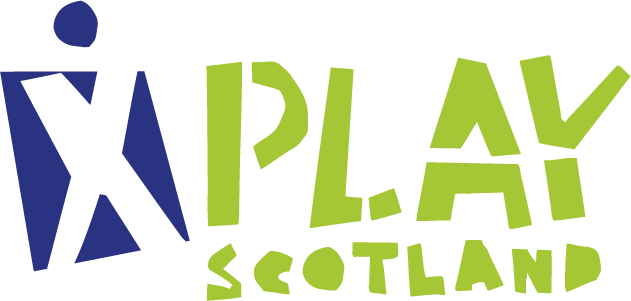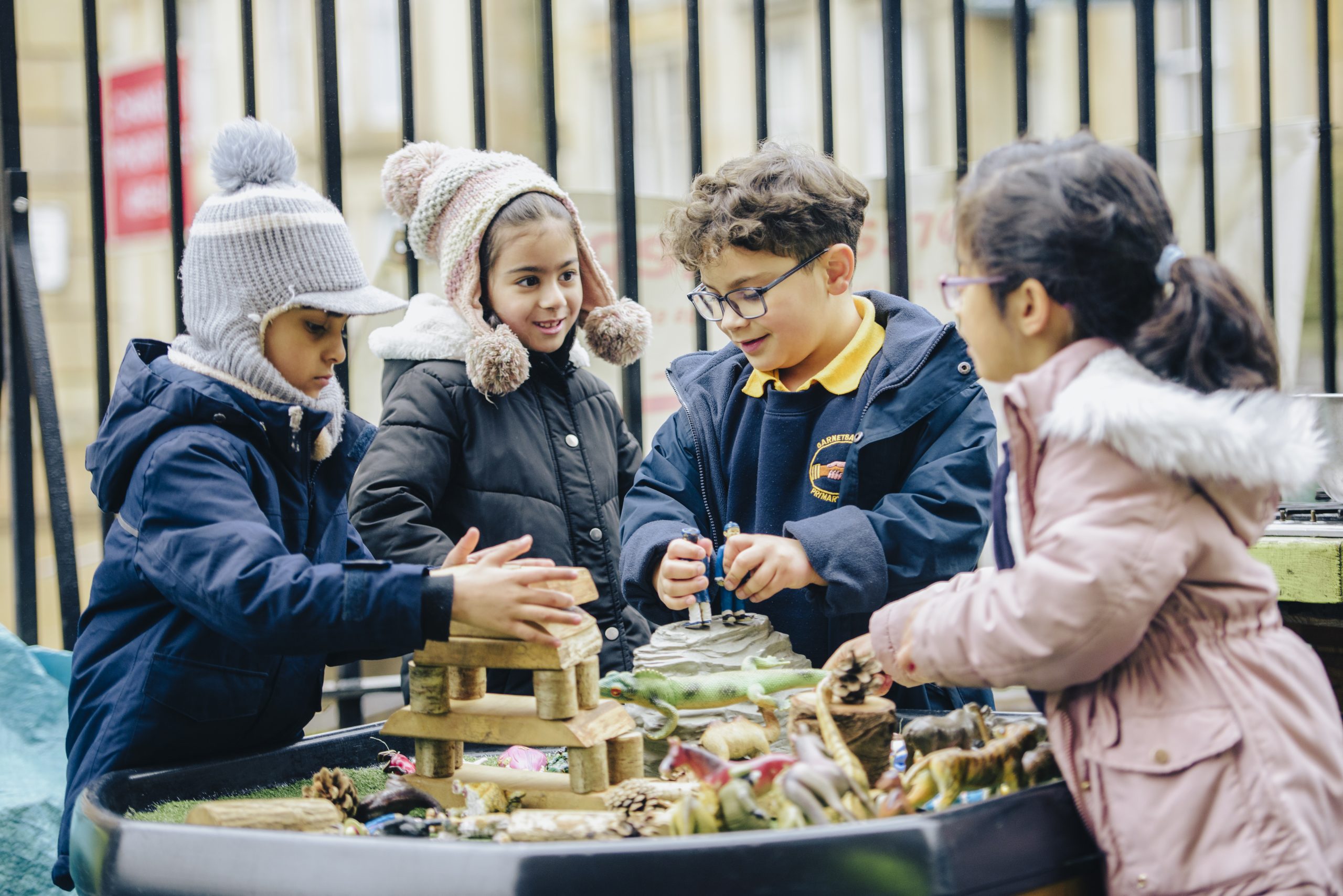It is fair to say that my job is pretty enjoyable. I work for Play Scotland, Scotland’s leading organisation for promoting play. I am the Outdoor Play and Learning (OPAL) mentor. OPAL is a school improvement programme that supports schools to make environmental and cultural changes, which bring about amazing playtimes for children. The impacts delivered by OPAL are wide and deep, ranging from children excitedly looking forward to going to school, to measurable improvements in behaviour, teaching time and attainment. So, I was pleased to face the challenge of thinking through and explaining why a group of professionals dedicated to teaching children language skills should share my enthusiasm for creating amazing playtimes.
See for yourselves
To begin with, I could tell you all about how different OPAL schools are compared to other schools – how they look, how they sound. However, it is much better for you to see for yourselves in this short film from one lunchtime:
What is Special About an OPAL Playtime?
Home – Outdoor Play And Learning
OPAL schools also differ from each other. Bespoke solutions are created to turn each set of particular challenges into specific opportunities to improve play. What all OPAL schools share though is this: by being outside in almost all weathers, wringing every last drop of play value from the available space, and planning and coordinating play as you would any other curricular area, children and staff are happier, learning time increases, accidents decrease and behaviour improves.
Talking to yourself
To bottom out how an abundance of freely chosen, self-directed and intrinsically motivated activity, or ‘Play’ as it’s known, supports teaching language I would like to turn to Lev Vygotsky (1896-1934), the increasingly fashionable Soviet psychologist. My relationship with Vygotsky began over 25yrs ago when I helped establish a youth research charity to campaign against increased restrictions on children in public spaces. We had to understand the significance of play to child development.
Many discussions about child development tend to fall into one of two camps: nurture or nature. Rather than emphasise just one aspect, Vygotsky understood that three areas of life: evolution or natural processes; nurture or an individual’s social experiences; and the broader cultural world, simultaneously work together to develop individuals and remake society.
Vygotsky’s heroes, Marx and Engels, had first posited that changes in society and the material conditions of life continually bring about changes in thought and behaviour. Vygotsky applied this approach, the use of physical and psychological tools, to establish the key moments in the development of children. He understood the point at which children master cultural behaviour is hugely significant. We can understand language to be one such ‘tool’.
You too can witness this as small children talk themselves through difficult activities. Children use language to organise their thoughts when trying to accomplish tasks. So much so that when prevented from speaking, their performance drops off significantly. Once when I was on holiday in Ceret, on the France / Spain border, my children were playing in the Place des Neuf Jets with trilingual kids (French, Catalan and English). Their ball ended up in the fountain and one of the friends worked out how to solve the conundrum in Catalan before explaining the idea to my children in English. By speaking to themselves, out loud, children better facilitate their thoughts and organise their own (and other’s) actions.
Learning, then Development
As we place increasingly challenging play opportunities in front of children, they have to adopt, sometimes unconsciously, better strategies in order to succeed. Utilising language at an individual level, as an organisational tool, is one such strategy. Working together with friends in cooperative relationships is another. And improving one’s personal abilities by working and communicating with more able children is yet another. In these situations, language is a ‘live’, rather than ‘dead’ or an artificial tool, applicable to the very moment in which it is conceived. Language teachers might take advantage of this tendency by developing problem solving games with the added ‘complication’ of having to operate in different languages; like a linguistic ‘Chinese Whispers’, seeing if the message gets through or becomes too corrupted.
For many people, learning cannot take place until a child is developmentally ready. Vygotsky inverted this understanding. He identified that every aspect of a child’s cultural learning can be seen twice. Firstly, on a social level between friends or playmates, and then internally within the child. Playing together takes children beyond themselves. They act in a more competent manner and only then can their internal self ‘catch up’ so to speak.
When children engage in imaginative and symbolic play together, they operate in idealised ways, placing stringent ‘rules’ on their activity. If it were ‘real life’ they would be ‘themselves’ and behave as themselves – they wouldn’t be ‘playing’. In play however, expectations correspond to their adopted roles. I remember secretly watching a friend’s son crossing a road with his younger sister. He thought he was on his own and was therefore the ‘grown up’. Using language again, he explained very correctly (and loudly) how you must look left and right and keep looking and listening. When with an adult he was one of the flakiest road crossers you’d ever come across- but in the ‘make believe’ moment he was, in Vygotsky’s words, ‘a head taller’ than himself. (Both children are alive and well today!)
Bananas and Igloos
When a banana becomes a telephone or when a tarpaulin den is built to be an igloo, protecting playmates from the blizzard outside, new opportunities are created. If we introduce more capable friends into these scenarios, the subsequent dialogue will again raise the level of functioning of the original children above their initial capability. The friend’s input raises their problem solving ability above their level of actual development. Vygotsky termed this new developmental space, based on dialogue, as the ‘zone of proximal development’ (ZDP). Through language and communication, the original children have grown into the intellectual life around them.
Play can be said to allow children to act in a freer way- independent from the concrete situation. At the same time though, while children are liberated from reality, they actually impose constraints or rules on themselves that are based on their idealised understanding of the real world. This allows play to be both enjoyable but simultaneously very demanding, as the controls they exert are greater than those when adults are around. Language and play are intrinsically linked and mutually reinforcing. Without necessary realising it, children will practice their existing language and develop new language through playing together. The play environment creates a ZPD for children.
I tried to use this myself when delivering ESOL (English as a Second or Other Language) to Polish steel workers. My trained colleague fell ill the day before a well-subscribed course was due to start, leaving me to ‘wing-it’! I relied heavily on the international language of laughter by deploying Mr Bean videos- having more capable learners reenact scenes together and explain to the rest of the class what they were doing! I even learned a bit of Polish myself, needing to build on my existing two words of ‘Lech’ ‘Walesa’.
Become a ‘Play Worker’!
In play what passes unnoticed by the child in real life becomes a rule of behaviour. Bart Simpson would call play workers ‘Sneaky’ teachers. He would hate to be duped into learning anything unnecessarily! But children learn and develop in a plethora of ways through play, often learning what adults can’t actually teach them. Just by creating better play environments and adopting a more playful culture that allows play to flourish (as in school in the video linked to above), a language curriculum can be enhanced through non-curricular play. Give it a go. Sorry Bart.





